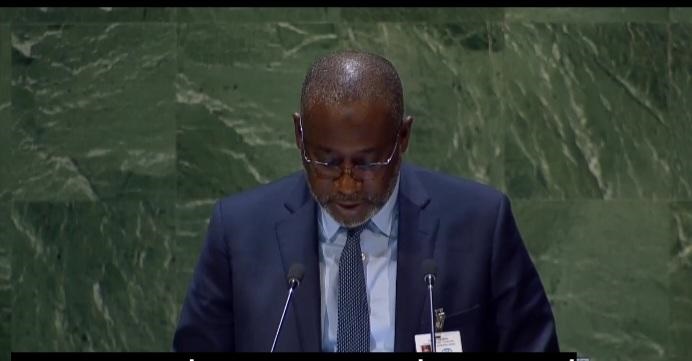The Minister of Water Resources, Alhaji Suleiman Adamu, has shared some success stories about Nigeria’s efforts to provide basic water and adequate sanitation for its citizens.

Adamu made this known while delivering Nigeria’s statement at a plenary session at the ongoing 2023 UN Water Conference on Thursday,March 23, 2023, in New York.
The UN Water Conference, which opened on Wednesday, is taking place as this vital natural resource is being depleted, polluted and mismanaged.
The minister told the gathering that, within the last seven years, the Nigerian Government had developed a National Action Plan for revitalisation of the Water, Sanitation and Hygiene (WASH) Sector.
He said the Plan, alongside the declaration of a “State of Emergency” on the Sector by President Muhammadu Buhari, was a clear demonstration of political commitment at the highest level.
“In relation to this, we initiated various actions to achieve the much-desired aspiration of meeting the Sustainable Development Goal (SDGs) 6 targets, which include the following.
“The ‘Partnership for Expanded Water Supply, Sanitation and Hygiene (PEWASH)’ Programme, a national collaborative instrument towards improving access to water and sanitation specifically in rural areas.
“The National Roadmap and Programme to End Open Defecation by 2025, tagged ‘Clean Nigeria: Use the Toilet’ Campaign, backed by a Presidential Executive Order is on course.
“Inauguration of the Organised Private Sector in WASH (OPS-WASH) Forum, for effective coordination of private sector participation in the sector.
“Last year, Nigeria, in collaboration with OPS-WASH and the World Toilet Organisation, hosted the 2022 World Toilet Summit with focus on sanitation innovations for economic development,’’ he said.
Adamu said that the Nigerian Government had been building on the gains of the Summit to harness opportunities within the circular sanitation economy in the country.
According to him, the bi-annual WASH National Outcome Routine Mapping (WASHNORM) Survey is to monitor progress on the SDG 6 targets.
In addition, the minister said that Nigeria established the WASH Information Management System (WASHIMS), which is a database specific for WASH and integrated into the sector wide National Water Resources Information System (NAWIS).
“The SchoolWASH and HealthWASH programmes, in collaboration with relevant sector Ministries, towards improving access to WASH services in academic and health institutions.
“The YouthWASH programme, aimed at harnessing the vibrancy and creativity of Nigerian youths in advancing national WASH targets, especially towards ending open defecation, was also initiated,’’ he said.
Adamu further said that the Nigerian Government was committed to strengthening systems and ensuring sustainable management of our water resources using national, international and non-governmental collaborative instruments.
He said that Nigeria recently ratified the instrument of Accession to the UN Water Convention.
“We are also in the forefront at pursuing climate resilient approaches in the management of our national and transboundary water resources.
“In this regard, we call on the international community to fully support Nigeria’s quest in saving the Lake Chad from extinction, with the potentially disastrous consequences this would have on the lives of about 40 million people.’’
He, however, called on Member States to double their commitment to achieve water goals, saying for too long the world has paid little attention to water.
“This Conference offers an opportunity to renew focus on the importance of water and its bearing on the well-being of planet earth.
“Nigeria, therefore, fully supports the call for the appointment of a UN Special Envoy on Water and preferably a High-Level Personality from Africa.
“A personality from Africa being the Continent that continues to face the most critical challenges of access to potable water, climate change and transboundary water resources management,’’ the minister said.
According to him, Nigeria is endowed with adequate fresh water resources, noting that the distribution in time and space is a major management challenge.
He said the Nigerian Government had been taking concrete steps towards ensuring sustainable development of the country’s water resources for the benefit of its people.
“We identified the critical need to put in place the appropriate water resources legislation and ensure that all relevant policy documents are developed or reviewed to meet the current aspiration of universal access.
“The new Water Resources Bill which provides for effective water sector governance, catchment management and regulatory framework for private sector participation in water supply delivery, is currently receiving legislative attention at our National Assembly.
“The intended legislation aims to strengthen existing laws and complement the new National Water Resources Policy and Strategy being implemented,’’ the minister said.
The three-day event, co-hosted by the Kingdom of the Netherlands and Tajikistan, falls at the halfway point for achieving the Sustainable Development Goals (SDGs), which include the promise of ensuring that all people have access to safe water and sanitation by 2030.
By Cecilia Ologunagba
